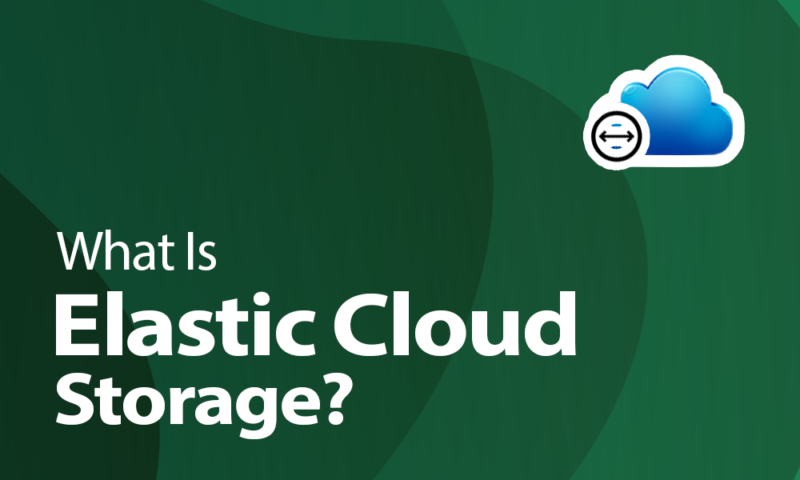What Is Elastic Cloud Storage? A Guide to ECS in 2024
Elastic cloud storage is a great solution to a common online storage problem: you never know how much space you'll end up needing. Read this guide for all you need to know about ECS.
Having quick and easy access to files and collaboration programs is a must for any modern business. Setting up a cloud storage system can bring better performance and faster results that keep your customers happy. Traditional cloud storage might not always be ideal, but elastic cloud storage — or ECS for short — could prove to be a game-changer for your company.
What Is Elastic Cloud Storage?
As its name implies, ECS is a form of cloud storage from Dell EMC that can expand its capacity when your business needs it (like when you’re working on a large project) and then reduce that capacity when you’re not using it. It works by setting up a cloud for your company on-premises using special hardware and software. Its most prominent features include:
- Top tier physical and digital security
- Scalability as the business grows
- Flexible storage capacity
- Easier data management
- Greater storage efficiency
- Tiered access levels to stored data
Read on to find out exactly how elastic cloud storage works and how it can adapt to your business’ needs.
How ECS Works
ECS is the answer to common problems with traditional cloud data storage. Having physical data in the office instead of an offsite server (like how most cloud storage works) means that accessing your files no longer depends on your internet connection. ECS is fast, too, because storage is mostly done locally.
However, ECS uses remote data centers as well, which is where the “elastic” part of its name comes into play. Dell hosts its data on servers across the U.S., Europe and the Asia-Pacific region, which gives its server network excellent coverage. These servers can take your data loads when your storage requirements spike.
An ECS platform manages your files differently than traditional storage. Instead of a file system, your data is organized into objects which hold much richer metadata than typical files. This makes an object storage platform easier to index and manage than a typical file storage system.
Unlike traditional storage, ECS’ object storage architecture is far less static and can mold itself to the requirements of the business it’s deployed in. Storage is divided into individual layers which can be scaled independently, so being able to scale and shape each layer of ECS storage lets businesses add what they need without having to upgrade what they don’t.
Data Storage Capability
An ECS stack from DellEMC can store up to 6PB of data. To put that into perspective, even the most spacious offerings from the cloud platforms on our online storage comparison chart offer only up to 30TB of storage. If you use these figures as a baseline, the math shows that ECS has thousands of times the storage space of what is commonly offered.
As a business grows, so does how much data it needs to store. With ECS, there’s no limit to the storage you can employ or what kinds of tools you can run. If it all works as advertised, we’re talking about a real sea change in what’s possible with cloud computing.
Elastic Cloud Storage and Data Security
Data at rest is secured by server-side encryption and the HTTPS protocol encrypts your data with SSL/TLS. This dual encryption protects data anywhere it might be vulnerable. Additionally, because all object data is encrypted and only you have the encryption key (also known as zero-knowledge encryption), your data can’t be unscrambled in the case of theft.
One of ECS’ strongest features is that data is stored in the user’s building. Normal cloud storage happens in offsite servers. With offsite servers, users have no idea where the data is physically located or who can access it. Storing data on an onsite stack protects business owners from these possible threats.
The Cost of ECS
According to Dell, ECS costs 48 percent less than other cloud storage options. Users will need to request an individual quote for an exact amount. To try it out, Dell lets potential customers download a non-production version of ECS storage software for free.
ECS can keep its prices this low because of its setup. ECS does have industry-grade hardware but is software-defined so users can enjoy the same economics as any public cloud environment.
Notable ECS Features
ECS can communicate in commonly used APIs such as S3, Swift, NFS/CIFS, Atmos and Centera.
ECS’ object storage infrastructure allows for metadata searches. Users and applications can search for user-defined and system-defined metadata in order to easily get critical information.
Users can set up access levels for ECS cloud storage systems. ECS has “multi-tenancy,” which allows administrators to restrict which levels of data users have access to. The benefit of this feature to businesses with sensitive finance or product information is huge. This means that a ransomware or malware attack on a computer at a lower access tier won’t lead to the entire system failing.
Final Thoughts
For a large business with high security needs and a lot of data, ECS can provide a lot of value. It offers a level of agility that can give your business the competitive edge it needs. With flexible storage capacities and excellent object data management features, it could become indispensable as your business grows and evolves.
Do you think ECS is what your company needs? Is your company ready to jump ship from traditional cloud storage? Let us know in the comments below. Thank you for reading.
FAQ
Dell ECS stands for “Dell Elastic Cloud Storage.” It provides companies with a flexible storage infrastructure with capacity that depends on data growth. It saves your business money by only using the storage capacity that it needs. If your storage use spikes with a higher workload, your storage capacity will increase and then shrink when your workload reduces.
EMC is a product by Dell that utilizes a software solution in conjunction with special hardware to create a unique hybrid cloud storage platform. Your company can use its hardware to store massive amounts of data, plus it can use Dell’s cloud data centers to expand that storage for projects demanding more storage than the hardware can handle.



